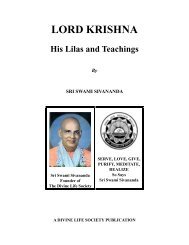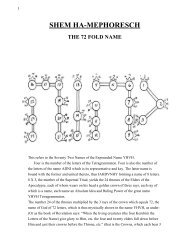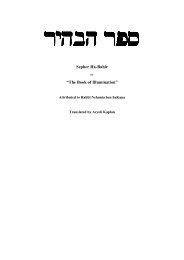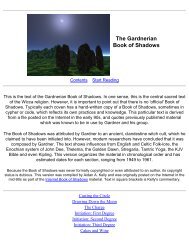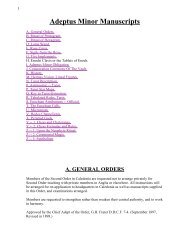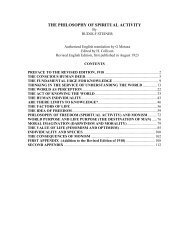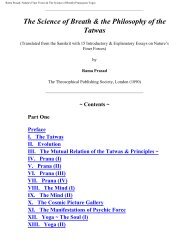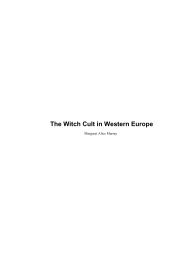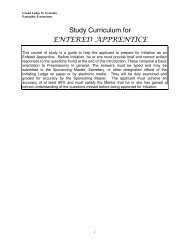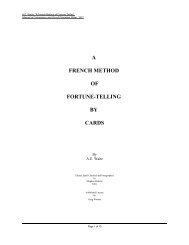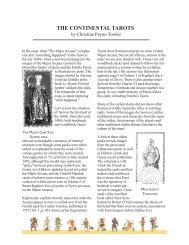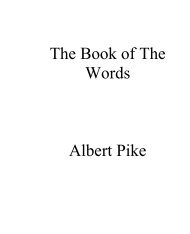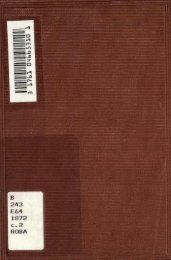Band 2 Anthropogenesis - H.P. Blavatsky
Band 2 Anthropogenesis - H.P. Blavatsky
Band 2 Anthropogenesis - H.P. Blavatsky
Create successful ePaper yourself
Turn your PDF publications into a flip-book with our unique Google optimized e-Paper software.
traditions about Hermes (of whom Egyptologists count five) Enoch, etc., they are all inventors of letters; none of them dies<br />
but still lives, and they are the first Initiators into, and Founders of the Mysteries. The Genesis of Enoch disappeared only<br />
very lately among the Kabalists. Guillaume [[Footnote continued on next page]]<br />
------------------------------------------------------------------------<br />
[[Vol. 2, Page]] 268 THE SECRET DOCTRINE.<br />
Thought Divine." St. Paul, another Initiate, called our world "the enigmatical mirror of pure truth," and St. Gregory, of<br />
Nazianzen, corroborated Hermes by stating that "things visible are but the shadow and delineation of things that we<br />
cannot see." It is an eternal combination, and images are repeated from the higher rung of the ladder of being down to<br />
the lower. The "Fall of the Angels," and the "War in Heaven" are repeated on every plane, the lower "mirror" disfiguring<br />
the image of the superior mirror, and each repeating it in its own way. Thus the Christian dogmas are but the<br />
reminiscences of the paradigms of Plato, who spoke of these things cautiously, as every Initiate would. But it is all as<br />
expressed in these few sentences of the Desatir:--<br />
"All that is on Earth, saith the Lord (Ormazd), is the shadow of something that is in the superior spheres. This luminous<br />
object (light, fire, etc.) is the shadow of that which is still more luminous than itself, and so on till it reaches ME, who am<br />
the light of lights."<br />
In the Kabalistic books, and in the Zohar pre-eminently, the idea that everything objective on earth or in this Universe is<br />
the Shadow -- Dyooknah -- of the eternal Light or Deity, is very strong.<br />
The Third Race was pre-eminently the bright shadow, at first, of the gods, whom tradition exiles on Earth after the<br />
allegorical war in Heaven; which became still more allegorical on Earth, for it was the war between spirit and matter. This<br />
war will last till the inner and divine man adjusts his outer terrestrial self to his own spiritual nature. Till then the dark and<br />
fierce passions of the former will be at eternal feud with his master, the Divine Man. But the animal will be tamed one day,<br />
because its nature will be changed, and harmony will reign once more between the two as before the "Fall," when even<br />
mortal man was created by the Elements and was not born.<br />
The above is made clear in all the great theogonies, principally in the Grecian (see Hesiod and Theogony). The mutilation<br />
of Uranos by his son Kronos, who thus condemns him to impotency, has never been understood by the modern<br />
Mythographers. Yet, it is very plain; and having been universal* (vide foot note infra), it must have contained a great<br />
abstract<br />
[[Footnote(s)]] -------------------------------------------------<br />
[[Footnote continued from previous page]] Postel saw it. It was most certainly in a great measure a transcript from the<br />
books of Hermes, and far anterior to the Books of Moses, as Eliphas Levi tells his readers.<br />
* Uranos is a modified Varuna, "the Universal encompasser," the all-embracer, and one of the oldest of the Vedic deities -<br />
- SPACE, the maker of Heaven and Earth, since both are manifested out of his (or its) seed. It is only later that Varuna<br />
became the chief of the Adityas and a kind of Neptune riding on the Leviathan -- Makara, now the most sacred and<br />
mysterious of the signs of the Zodiac. Varuna, "without whom no creature can even wink," was degraded like Uranos,<br />
and, like him, he fell into generation, his functions, "the grandest cosmical functions," as Muir calls them, having been<br />
lowered down from heaven to earth by exoteric anthropomorphism. As the same [[Footnote continued on next page]]<br />
------------------------------------------------------------------------<br />
[[Vol. 2, Page]] 269 THE SYMBOLISM OF KRONOS.<br />
and philosophical idea, now lost to our modern sages. This punishment in the allegory marks, indeed "a new period, a<br />
second phase in the development of creation," as justly remarked by Decharme (Mythologie de la Grece Antique, p. 7),<br />
who, however, renounces the attempt to explain it. Uranos has tried to oppose an impediment to that development, or<br />
natural evolution, by destroying all his children as soon as born. Uranos, who personifies all the creative powers of, and<br />
in, Chaos (Space, or the unmanifested Deity) is thus made to pay the penalty; for it is those powers which cause the Pitris<br />
to evolve primordial men from themselves -- as, later on, these men evolve their progeny -- without any sense or desire<br />
for procreation. The work of generation, suspended during a moment, passes into the hands of Kronos,* time, who unites<br />
himself with Rhea (the earth in esotericism -- matter in general), and thus produces, after celestial -- terrestrial Titans. The<br />
whole of this symbolism relates to the mysteries of Evolution.<br />
This allegory is the exoteric version of the esoteric doctrine given in this part of our work. For in Kronos we see the same<br />
story repeated again. As Uranos destroyed his children from Gaia (one, in the world of manifestation, with Aditi or the<br />
Great Cosmic Deep) by confining them in the bosom of the Earth, Tythea, so Kronos at this second stage of creation<br />
destroyed his children from Rhea -- by devouring them. This is an allusion to the fruitless efforts of Earth or Nature alone<br />
to create real human men. (See our Stanzas III. -- X., et seq., and also Berosus' account of primeval creation.) Time<br />
swallows its own fruitless work. Then comes Zeus -- Jupiter, who dethrones his father in his turn.** Jupiter the Titan, is<br />
Prometheus, in one sense,*** and varies from Zeus, the Great<br />
[[Footnote(s)]] -------------------------------------------------<br />
[[Footnote continued from previous page]] Orientalist says, "The attributes ascribed to Varuna (in the Vedas) impart to his<br />
character a moral elevation and sanctity far surpassing that attributed to any other Vedic Deity." But to understand<br />
correctly the reason of his fall, like that of Uranos, one has to see in every exoteric religion the imperfect and sinful work<br />
of man's fancy, and also to study the mysteries which Varuna is said to have imparted to Vasishta. Only . . . "his secrets<br />
and those of Mitra are not to be revealed to the foolish."<br />
* Kronos is not only [[Chronos]], time, but also, as Breal showed in his Hercule et Cacus (p. 57), comes from the root Kar,<br />
"to make, to create." Whether Breal and Decharme, who quotes him, are as right in saying that in the Vedas Kronan is a



